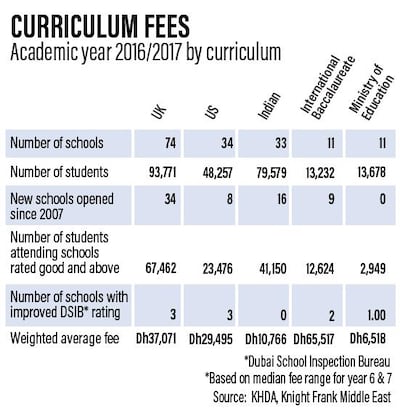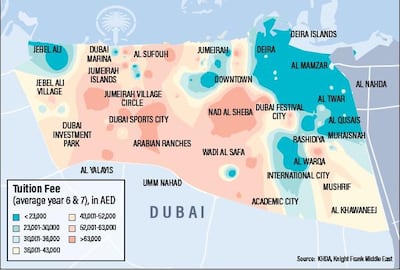The International Baccalaureate is the fastest growing curriculum in Dubai, a new report has revealed.
The market share of the curriculum has increase from 2 per cent in 2010 to 6 per cent in 2017, research by UK-based property consultancy Knight Frank found.
“IB curriculum and British curriculum are truly international and are transferable, thus they are popular,” said Natasha Ridge, executive director at Sheikh Saud bin Saqr Al Qasimi Foundation for Policy Research.
"You can take the certificate anywhere in the world.
"For most of the UAE population, who are from other countries, they want to know they can use their degree to get into any university anywhere. If they leave the UAE, they can easily transfer to a school somewhere else."
The British curriculum remains the most popular with a pupil population of 93,771, while Indian curriculum schools have 79,579 pupils in Dubai.
"Some of [the Indian] schools are not expensive and are doing a very good job. I know Emirati parents in Ras al Khaimah who send their children to Indian schools,” said Ms Ridge.

Competitive tuition fees and focus on core subjects draw pupils to the Indian curriculum, where the average fee at a school is Dh10,766.
IB curriculum is still however considered the gold standard by many, and universities have been known to vie for pupils who have attained the baccalaureate.
While British schools in Dubai charge an average of Dh37,071, IB schools charge an average tuition fee of Dh65,517.
American schools have seen a slight decline in their market share from 22 per cent in 2010 to 18 per cent in 2017. On average, American curriculum schools charge a tuition fee of Dh29,495.
Shehzad Jamal, partner at Knight Frank, said that it is the style of learning and transferable credits that attract pupils to IB schools.
“IB is a curriculum that has quality standards and parents also like that it allows for credits from many universities,” he said.

“The curriculum instils the attributes of independent learning, which is the need of the day.”
On the popularity of the UK curriculum, he said that these schools serve various segments of society — a UK curriculum school might charge as little as Dh10,000 per year for a grade one pupil or as much as Dh70,000.
The report found that the number of private Ministry of Education curriculum schools reduced from 15 in 2010 to 11 in 2017.
"As time progresses, these schools are faced with increased competition as a result of improving standards in public sector schools and also options available to parents to enrol their children in schools offering Western curricula,” said the report.
Mr Jamal believes that an increasing number of Emirati families are considering international curriculums so that children can have access to the multinational population.
“Public sector schools are providing MOE curriculum and since they are improving, there is really no chance of sending children to a private school and getting the same," he said.
“Emiratis want their children to improve their communication skills, have exposure to the international community, and be prepared for the world," he said.
"While previously people would travel many kilometres to go to school, now there are so many options available that parents are looking for the most convenient options within their price range."
_________________
Read More:
UAE students get top marks in IB exams — and set sights on Europe
UAE pupils exceed global average in International Baccalaureate
The UAE's most expensive school officially opens
_________________


